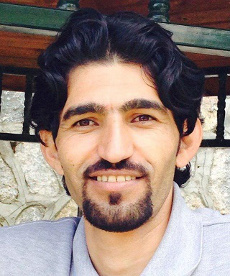Amidst Health Concerns for Hunger-Striking Gonabadi Darvishes, Prison Warden Says their Deaths would Mean “Less Garbage”
As Gonabadi darvishes on hunger strike at Tehran’s Fashafuyeh Prison face serious medical problems in sub-standard conditions, the official responsible for their well-being, Warden Farzadi, has dismissed concerns for their health with concerning flippancy, stating that their deaths would make for “one less piece of garbage” [1].
Following an August 29 incident during which Fashafuyeh prison guards assaulted and beat darvish inmates, a number of darvishes launched a hunger strikes demanding that authorities release imprisoned darvish women, end the house arrest of their spiritual leader Nour Ali Tabandeh, and relocate all darvish inmates at the Fashafuyeh facility to a single ward [2].
Majzuban-e Noor, a site affiliated with the Gonabadi darvishes, reports that many of the Fashafuyeh hunger-strikers face dire medical issues. One of them, Mojtaba Biranvand, was previously transferred to the prison’s clinic owing to extreme physical weakness. Biranvand refused an IV drip, insisting on maintaining his hunger strike until he and his fellow darvishes’ demands were fulfilled. Abbas Dehqan, another hunger-striker who possesses one kidney, is also struggling with medical problems.
Those being held at Fashafuyeh were taken into custody during the course of a February 2018 crackdown on protesting darvishes, who had gathered on Golestan Haftom street in Tehran’s Pasdaran neighborhood to protect their spiritual leader from arrest. In July, ten of them were given sentences which together amounted to 69 years’ incarceration, 444 lashes, and 14 years of domestic exile, according to Radio Farda. One darvish active in the protests, Mohammad Salas, was arrested, sentenced to death, and executed for a fatal truck collision in a legal process which human rights observers inside and outside the country characterized as hasty, opaque, and unfair.
Sub-standard conditions at Fashufuyeh Prison, known officially as “Greater Tehran Prison,” recently made headlines following the distribution of inmate Nader Fatourehchi’s account of the remote and secretive facility. Fatourehchi described overcrowding, lack of sanitation, under-staffing, and a culture which marginalizes those deemed “outcasts” like drug addicts and Afghan migrants – all against the background of an administrative structure which keeps families, most of them poor, in the dark regarding the fate of their imprisoned loves ones.
The treatment of darvishes imprisoned at Fashafuyeh and Warden Farzadi’s declared indifference to their well-being fits a pattern of neglect and abuse in the Iranian prison system which violates international human rights norms regarding incarcerated persons. The United Nations Standard Minimum Rules for the Treatment of Prisoners specifies that “Sick prisoners who require specialist treatment shall be transferred to specialized institutions or to civil hospitals. Where hospital facilities are provided in an institution, their equipment, furnishings and pharmaceutical supplies shall be proper for the medical care and treatment of sick prisoners, and there shall be a staff of suitable trained officers.”
The Rules further state that the administration of prisons depends on the “integrity, humanity, professional capacity and personal suitability for the work” of staff, and that “director[s] of institutions” specifically should be “adequately qualified for [their] task by character, administrative ability, suitable training and experience.”
—
[1] Telegram channel of Majzbunan-e Noor, site affiliated with the Gonabadi darvishes
[2] Darvishes participating in the hunger strike comprise Saleh Al-Din Moradi, Mohammad Reza Darvishi, Ali Bolboli, Abbas Dehqan, Ali Mohammadshahi, Mojtaba Biranvand, Ali Karimi, Ja’far Ahmadi, Ebrahim Allahbakhsi, Heydar Timouri, Majid Yarahmadi, Sa’id Soltanpour, Babak Taqiyan, Ehsan Malek Mohammadi, Sekhavat Salimi, Reza Bavi, Majid Rashidi, and Akbar Dadashi





 My Interrogator Said: You Are An Ass, And Asses Do Not Merit Human Rights
My Interrogator Said: You Are An Ass, And Asses Do Not Merit Human Rights